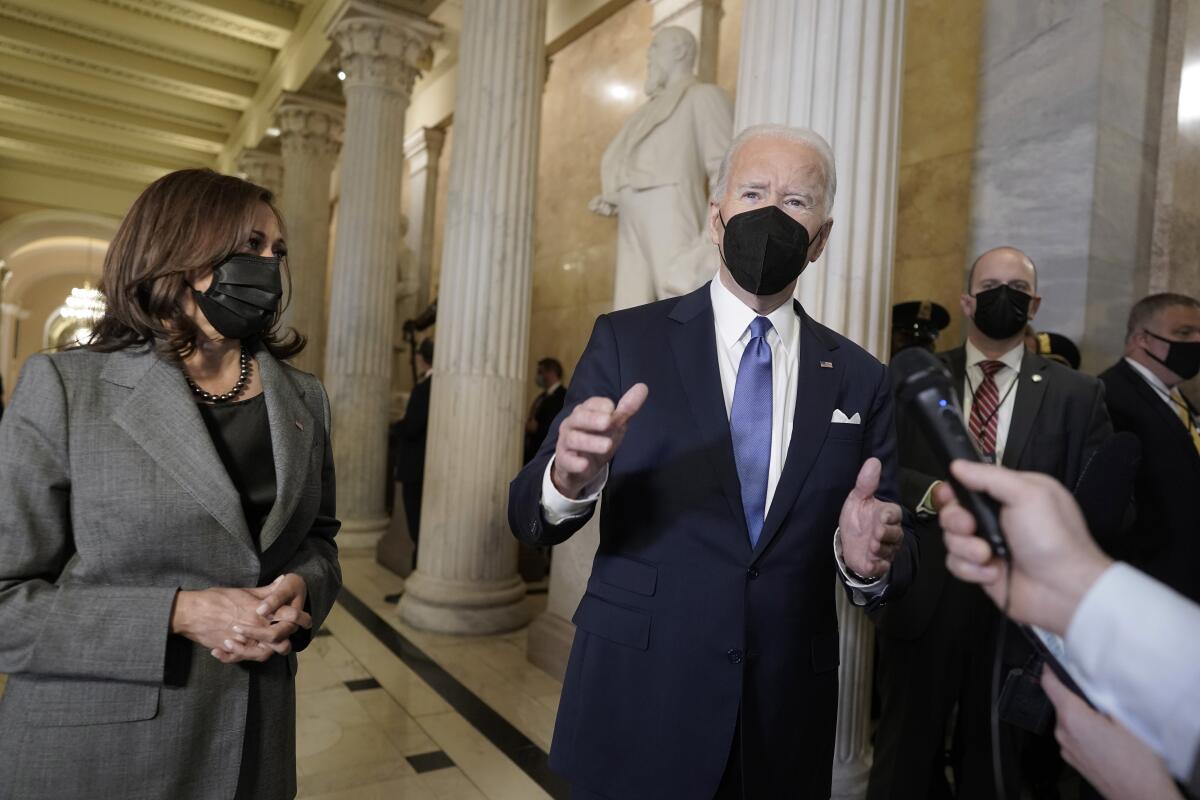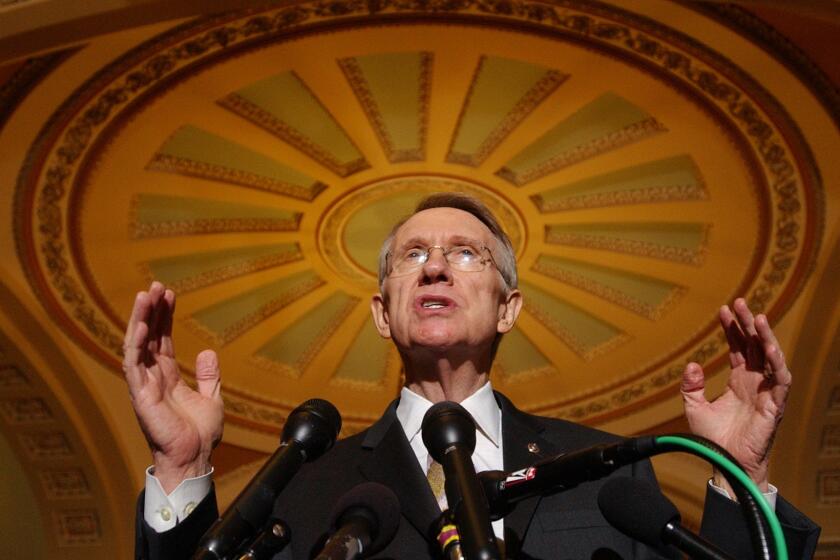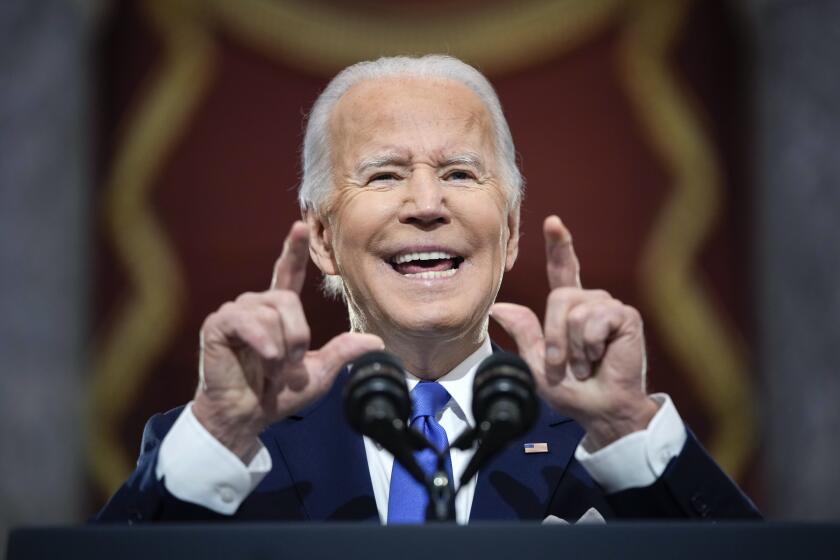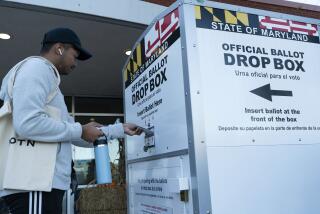News Analysis: ‘There is no Plan B’: Biden trading one challenge for another with voting rights push

- Share via
WASHINGTON — Fresh off the apparent demise of the centerpiece of his domestic agenda, President Biden is gearing up to tackle an equally daunting challenge: enacting voting rights legislation.
The pivot underscores the pressure the president is facing from his base to do something about Republican-backed state laws that restrict access to the polls before the November midterm election. The reality is that Biden can no longer postpone a reckoning on voting rights, no matter how much he might rather focus on salvaging his social spending and climate plan.
The president’s first major step in the voting rights campaign will come Tuesday in a speech that the White House says will be an urgent call for Congress to pass voting rights legislation. This is no small matter — the only way Democrats can enact such laws would be to at least partially jettison the Senate’s filibuster rule, a move that would inflame political tensions and alter the chamber’s dynamics for years to come.
Driving the Democratic anxiety over voting rights are dozens of state laws enacted by Republican lawmakers before the midterm. Such laws have stiffened voter ID requirements, established obstacles to voting by mail, reduced the number of polling places and enhanced roles for partisans in overseeing the election process.
The measures have been enacted by Republican lawmakers who promote — or are taking advantage of — former President Trump’s lie that the 2020 election was stolen. Polls show most Republicans believe Biden’s victory was fraudulent.
Democrats say such state statutes pose a threat to democracy.
“Right now, in state after state, new laws are being written not to protect the vote, but to deny it,” Biden said Thursday. “The former president and his supporters have decided the only way for them to win is to suppress your vote and subvert our elections.”
In the last years of his life, former Senate Majority Leader Harry Reid urged Democrats to build on his legacy of ending the filibuster.
Biden and Vice President Kamala Harris are expected to more forcefully address the issue during a trip on Tuesday to Georgia, which has passed an extensive overhaul of voting laws decried by activists and Democrats. The White House says Biden and Harris will explain why it is critical that Congress passes legislation “to protect the constitutional right to vote and the integrity of our elections from corrupt attempts to strip law-abiding citizens of their fundamental freedoms.”
Republicans counter that such laws are needed to ensure elections are being carried out securely and they deny that the limitations on voting options will restrict voting.
The “argument is that somehow state legislatures across the country are visibly at work trying to make it more difficult for people to vote,” Senate Minority Mitch McConnell (R-Ky.) said Tuesday. “Of course, that’s not happening anywhere in America.”
Voting rights advocates say Biden should have taken a more forceful approach far earlier. They have been deeply frustrated that the White House prioritized passing a $1.75-trillion social welfare and climate bill, known as “Build Back Better.”
That legislation was derailed in December by Sen. Joe Manchin III (D-W.Va.) after months of negotiation, though Democrats have been holding out hope that the White House and Senate leaders might still salvage a deal. Before that, the president spent his political capital on successfully pushing through a $1-trillion infrastructure law.
“What we saw was a rigid adherence to their agenda, because they wanted to push it through,” said Nsé Ufot, chief executive of the New Georgia Project voter advocacy group.
“What we’re seeing now is the pivot,” Ufot added. “It should have come earlier, but they’re pivoting and that’s important.”
Arndrea Waters King, the wife of Martin Luther King III, son of the slain civil rights leader, told The Times recently that “the administration stood up for bridges, and now it’s time to stand up for the people.”
President Biden’s first year is dominated by tension between his vow to return the U.S. to normal and the reality that Trump changed it profoundly.
Democrats are pursuing two voting rights bills that have unanimous support among their caucus but were blocked from consideration by Republicans last year.
The Freedom to Vote Act was spearheaded by Manchin in a bid to win bipartisan support. It would make election day a national holiday and set standards for voter ID requirements as well as early and mail voting. It would also restore the voting rights of formerly incarcerated individuals.
The John Lewis Voting Rights Act would strengthen the Voting Rights Act of 1965, which in recent years has been weakened by Supreme Court rulings.
Senate Majority Leader Charles E. Schumer (D-N.Y.) said the Senate will vote by Jan. 17, Martin Luther King Jr. Day, on changing the filibuster, a rule that requires 60 votes to advance legislation, if Republicans continue to block the measures.
Changing the filibuster is a fraught endeavor, one that could transform the power balance of the Senate, which is evenly divided between Republicans and Democrats (including two independents who caucus with them).
Many Senate Democrats have said that they support killing the filibuster, and Biden has said he is open to seeking a “carve-out” that would permit voting rights legislation to advance with a majority vote.
They are facing stiff resistance from Manchin and Sen. Kyrsten Sinema (D-Ariz.), who say any efforts to weaken the filibuster would damage the Senate.
Without winning them over, which is unlikely, Schumer and Biden have no chance of passing the bills.
Presidents rarely get credit for pushing bills that ultimately fail to pass, and it is not clear whether voting rights advocates will give Biden a participation trophy.
“We appreciate the work and support for voting rights legislation; we hear [Biden’s] passion around the need to get it,” said Derrick Johnson, the chief executive of the National Assn. for the Advancement of Colored People. “But until it’s done, the grade is an incomplete.
“There is no alternative,” Johnson said. “There is no Plan B. This is the plan.”
More to Read
Get the L.A. Times Politics newsletter
Deeply reported insights into legislation, politics and policy from Sacramento, Washington and beyond. In your inbox twice per week.
You may occasionally receive promotional content from the Los Angeles Times.













